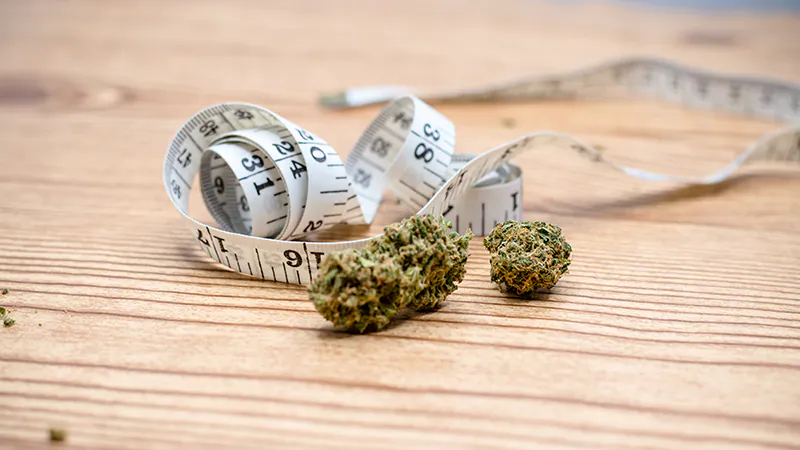Medical Cannabis For Weight Loss: Can Using Cannabis Make You Thinner?

I cannot count the number of times that I have spoken to patients about medical cannabis for weight loss who have raised the following objection: “I can’t use medical cannabis. I am already overweight! I can’t afford to gain any more weight.” And yet, the research suggests that people who regularly use medical cannabis have been found to have a lower BMI, smaller waist measurement, and a lower fasting insulin level compared to those who don’t. Many people are talking about cannabis as playing an important role in maintaining a healthy lifestyle along with healthy diet, exercise, and proper sleep. How can this be? Let’s take a deeper dive into the effects of cannabis on weight and metabolism.
Medical Cannabis For Weight Loss – Can It Really Help?
Some of the explanations are kind of straightforward. Because some cannabis users have found using cannabis has helped them by decreasing pain and inflammation, it may therefore allow people to be more active physically, burning more calories. Cannabis may also decrease feelings of stress and anxiety. Such feelings are often associated with increased release of “stress hormones” such as cortisol, a steroid which makes people more susceptible to obesity. Also, research has shown cannabis may improve sleep. Improved sleep decreases stress and the associated improved energy can also encourage people to be more active. These positive changes can explain some of the impact of medical cannabis, but one must wonder whether this is reflective of a correlation rather than causation. In addition, there are deeper, more complex changes which also play a role.
Cannabinoids And Strains That May Help Promote Weight Loss According To Current Research
THC, the cannabinoid associated with psychoactive effects, making you feel “high”, is also associated with increasing the desire for fatty and sweet food. Cannabis, however, makes food taste sweeter, which can lead to someone’s sweet tooth to be satisfied faster. Fruit seems more attractive as a dessert! Another cannabinoid, THCv, when used in moderation, has been shown to block the same receptors (CB1) that THC activates when causing these effects, which leads to decreased psychoactive effects and suppressed appetite.
CB1 receptors play a large role in energy uptake, storage and conservation. When CB1 receptors are activated by THC the taste and smell pathways are heightened, leading to increased caloric intake. Strains high in THCv include: Durban Poison, Girl Scout Cookies, Doug’s Varin, Dutch Treat, Tangie, and Pineapple Purps. There is no particular delivery method (smoke, vape, oils, edibles) that is preferred for using cannabis for its effects on homeostasis and balance of the metabolism. Use whatever works for you!
The Importance of Diet And Caloric Intake For Losing Weight
The Western Diet typically has a super-abundance of calories from sugars and refined starches as well as processed foods. This type of diet increases the glycemic load and leads to a strongly elevated omega-6/omega-3 (essential fatty acids) ratio. Hunter/gatherer societies had a ratio of 1:1 to 3:1, whereas modern Western diets have a ratio of as much as 20:1. This can lead to increased rates of obesity, unhealthy lipid profiles, insulin resistance, inflammation, and increased risks of cardiovascular disease. Did you know that proper nutrition can help prevent disease?
Elevated omega-6 fatty acids are precursors to two endocannabinoids known as AEA and 2-AG. These endocannabinoids act via both CB1 and CB2 receptors. CB1 receptors manage energy and homeostasis, including appetite and metabolism. Overstimulation of CB1 by elevated omega 6 causes increased appetite and metabolic dysfunction and leads to weight gain. Phytocannabinoids from the cannabis plant also interact with CB1 and CB2. CB1 receptors have a high affinity for THC, which is why it is associated with increased appetite and calorie consumption, “the munchies”, and makes it useful for encouraging weight gain in cancer patients and HIV/AIDS patients who are dealing with anorexia (lack of appetite) and wasting syndrome.
Despite increased calorie consumption, regular cannabis users seem to not gain weight, or have an increased BMI, or lipid and glucose levels. Over time, regular cannabis use may cause down-regulation behavior in the CB1 receptor, calming the overstimulated receptor which leads to a decreased BMI and increased appetite suppression. Decreased CB1 stimulation increases the ability of the gut brain satiation pathways to allow the body to signal the brain that no more food is needed.
CBD, another cannabinoid, counteracts the psychoactive effects and THC, and also seems to suppress appetite. In addition, CBD research indicates it may increase our body’s brown fat (brown adipose tissue). Brown fat burns through regular fat for fuel, and likely also contributes to decreasing patients’ BMIs.
There is research that points to omega 3 fatty acid supplements and cannabis together working to normalize the omega 6:omega 3 ratio, and combining the two may have a positive impact on controlling obesity. There is much left to study about the interplay of cannabis and weight, and as the prohibitions against medical cannabis continue to be lifted throughout our country we can expect to see more information about this being presented. In the meantime, please understand that a few extra pounds are not a good reason to avoid using cannabis, especially when its use will allow you to avoid other toxic chemicals and treatments.





